No Duff!

 Last weekend saw the results of several months work by myself and a few very close SAR friends. The first, possibly annual SARxSW (SAREx SoutWest) conference.
Last weekend saw the results of several months work by myself and a few very close SAR friends. The first, possibly annual SARxSW (SAREx SoutWest) conference.
After complaining for several years to my colleagues at BCSARA that British Columbia should have our very own SAR conference, I realized that I should probably get on with it and organize one. After all, BC has more SAR tasks than the rest of Canada combined, and we have more than enough to talk about that is BC specific. So I put the idea forward to a few people, and let loose with a six month long flurry of emails and phone calls.
The result was a one day conference with 115 people attending from all over British Columbia, and a one day regional SAR exercise with over 14 SAR groups in the air, land, water and on the internet (and in space, more on that later) participating.
No Duff
But first, about No Duff.
According to Wiktionary, “No Duff” is Canadian military slang for “this is not a test” – or, this is a REAL emergency. i.e.; my next transmission is not part of the exercise, it’s referring to a real event.
During Saturday’s conference pagers started going off, and it became apparent that many SAR teams were going to be sending members to Vancouver Island to assist Cowichan SAR with an ongoing search. I know North Shore Rescue responded to a task later on that evening. On Sunday, the same thing happened rather early on in the exercise we planned when Ridge Meadows SAR was called on a task – taking several of their own members and some from other teams. Sill later in the day, RCM-SAR station 2 was called on a real task in Indian Arm in the middle of the cross training exercise they were doing with members of GSAR teams. And still later, my own SAR team took the opportunity to search an area on Eagle Ridge for a missing person.
Arguably, that’s 5 No Duff calls during one event!
Every SAR training event takes on the risk of an actual response happening at the same time. A sunny fall weekend is a guarantee that there will be a SAR task. Teams are always ready to respond, and some of our fastest response times are from within a training event.
The Inspiration
The inspiration for the conference was this; Squamish SAR did one of the most significant rescues in North America last year. They rescued a gravely hypothermic subject from near a very popular backcountry skiing area near Squamish. The bystanders, SAR volunteers, and paramedics did CPR on her for just about 4 hours in the process of the rescue, and on the way to Vancouver General Hospital, where she was re-warmed, and left the hospital alive and with almost no lasting effects a week later. The record for a person to have CPR and live is about 6 hours, making this rescue possibly a record for North America, certainly the longest for anyone in British Columbia.
I wanted to hear about this rescue, and make sure that other SAR members from South Western BC could learn from it. This is called a case study and is one of the single most valuable opportunities to learn from. Unlike training, case studies present actual rescues and and opportunity to learn from them. This rescue had significant logistical, medical and technical aspects, and I wanted to hear about all of it. So the “conference” really just started with the idea of inviting a few people to hear about this case study, and it grew from there.
Organization
SAR members are possibly the most capable organizers on the planet.
Consider this; on a regular basis we organize logistics for events that are not scheduled, have random start times, go on for a random length of time, have no guest list, and no guest limit.
I’m not saying that we’d make good wedding planners, but if the wedding needed helicopters then sure, give us a call.
All I had to do is ask members of my team for help with this idea, and they stepped up. Organizing this was a pleasure, and ended up being relatively easy because of the amazing help. I won’t mention them by name here, but rest assured I’ve thanked the volunteers in person.
As far as speakers, they were amazing. They financed their own way from Terrace, Vancouver Island, Kelowna, and all over the south west, and NONE of them were paid. We had RCMP members, BC Ambulance Paramedics, city emergency planners, experts in UAV technology, Alzheimer’s disease, SAR Management, mapping and others. These people realize the value of sharing information, and the importance SAR volunteers put on learning.
And the sponsors; Douglas College was approached for space and they donated four rooms for all of Saturday, their facilities people set up a small trade show in the Atrium of the David Lam campus, we had corporate sponsors give us enough money to make a T-Shirt for the attendees, and to pay for lunch. The facility was perfect; centrally located to all of the SAR groups, and lots of space.
The biggest thanks goes to Sandra Riches and Mario Levesque, the BCSARA Regional Directors for the Sea-to-sky and Fraser Valley regions; they used their discretionary regional funding to finance the largest part of the conference, ensuring it’s success.
Finally, the SAR groups attended from all over the south west and the rest of BC as well. Clearly, people will drive a long way for a t-shirt.
Communications and Logistics Testing
Of course the other reason for the exercise was communications and logistics testing, and we got a LOT of that done during the day.
The original plan was to simulate a regional SAR response, with 4 different scenarios happening at the same time. What actually happened is that one was cancelled, two operated largely independently, reporting every so often for updates, and the largest on took up most of the effort.
The exercise on Pitt Lake was designed to simulate a type of search that my team and Ridge Meadows SAR have to respond to every so often, the two teams essentially sharing the response to the lake and beyond. Tasks in the area are challenged by communications, transportation and other logistics difficulties, and over the years various remedies have been proposed but never used. This was the opportunity to test a few of them at the same time.
Transportation
Ridge had a new landing craft, and my team has an 8×8 Argo Avenger. Other teams have similar marine and ATV assets. The first challenge was to test transporting people and equipment to the head of the lake. Once there we had to coordinate people to move up the upper Pitt River and via ATVs on the logging roads. We created a number of tasks, and check points, including setting out visual targets for CASARA to find from the air, and communications testing with the 442 Squadron Buffalo aircraft.
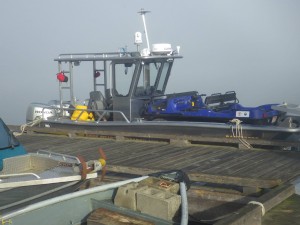
Communication
The second challenge was communications. Without comms, every SAR effort becomes more dangerous as a team can get into trouble and require assistance, or just need resources to do their task. Bad communications leads to inefficient searching as well. We had five communications tests in mind
- Fixed repeater communications:
Ridge Meadows has a repeater on Raven Peak and after recent upgrades we needed to test the range and effectiveness - Mobile Repeater testing
Coquitlam SAR recently acquired two new mobile cross-band capable Lite-Link repeaters from Chroma Communications. We’ve used this device in the past and it has saved our bacon. We needed to test a new configuration where the repeaters could be “chained” to the output of the fixed repeater, extending the communications network deep into the upper Pitt River valley. - Aerial relay
CASARA had two fixed wing aircraft available, and as well as searching they are capable of relaying messages. Being in the air they are very powerful and have a good, long range. - Amateur Radio
Our local Amateur Radio club provided HF equipment, and relayed messages from the Lake Head area, demonstrating a back-up system and showing resiliency in our SAR communications systems. - Satellite Tracking
Emergency Management BC and BCSARA have provided all BC SAR teams with an enterprise version of the Delorme InReach beacon, but many teams have not had an opportunity to test these extensively. The beacon can send email and text messages, as well as remotely track the location of field teams. This was the first extensive test of the system in a multi-agency exercise, and it worked very well. We learned a lot about the system, and will be writing up some recommendations on how to deploy the units in the future.
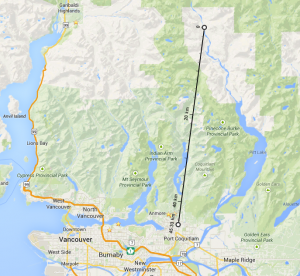
Command and control
The third major part of the day was a command an control exercise. This involved radio communications, testing transmission of SAR-related information via the various channels, tracking remote field units, and making use of several pieces of equipment we don’t usually use, including the RCMP Command Trailer pictures below.
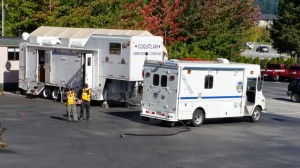
Initial Results
The results of the communications testing were very encouraging; we established five different communications systems to an extremely remote area of BC. In particular, testing the mobile repeater system showed that we have a resilient and adaptable system that can be established on the ground in cases where we can’t fly the repeaters to mountain tops, and can integrate with our existing fixed repeaters. This means that rather than building an extremely expensive fixed repeater system for what amounts to rare searches, we can use a flexible system to build a network as needed.
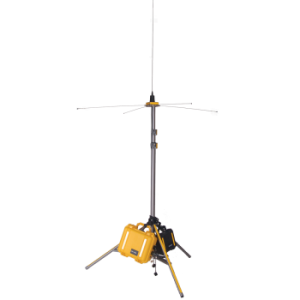
In the next few weeks I’ll be writing up some of the observations on this exercise; I’d like to thanks again the teams that participated;
- Ridge Meadows SAR for primary ICS and logistics
- Surrey SAR
- Mission SAR
- Central Fraser Valley SAR
- CASARA
- RCAF Transport and Rescue squadron 442
- Coquitlam Amateur Radio Club
- Royal Canadian Marina SAR Station 2
- Kent Harrison SAR
I am looking forward to next year.

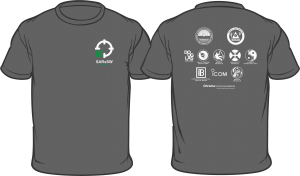
Congratulations. Sounds like a great weekend. We’ve been running a Vancouver Island wide Exercise “Rescue On The Rock” every 2 years for the past 6 years. I think it has helped our inter-group communications and procedures as we have been having more frequent Mutual Aid calls involving 6 or more SAR groups, CASARA and RCM Rescue.
I heard a saying years ago that I took to heart. “What you do in training, you do in operations”
Joe Kinch
Arrowsmith SAR
I had no idea you guys had a conference.
If you count the “SAR Beyond Hope”, and the Nelson SAREx, that makes four regional SAR conferences. Nice.
Kent Harrison SAR was there too Mikey!
Sorry about the omission!